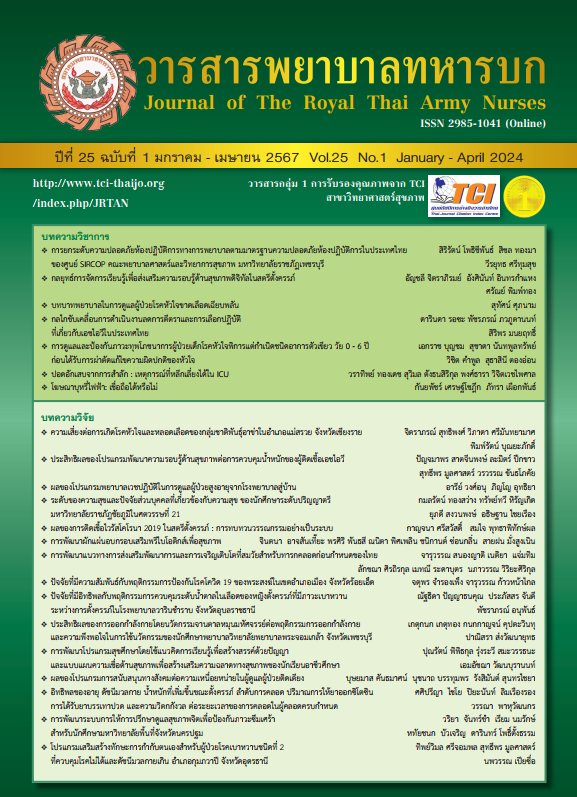Factors Influencing Blood Glucose Control Behavior among Pregnant Women with Gestational Diabetes Mellitus in Warinchamrap Hospital, Ubon Ratchathani Province
Keywords:
gestational diabetes mellitus, blood glucose control behavior, family interactionAbstract
The predictive correlational research aims of investigating the predictability of blood glucose control behavior among pregnant women with gestational diabetes mellitus in Warinchamrap hospital. The study recruited 53 pregnancy women with gestational diabetes mellitus following the inclusion criteria. Data were collected using questionnaires, including questionnaire of pregnancy women with gestational diabetic mellitus, family interaction questionnaire, health belief questionnaire and blood glucose control behavior of pregnancy women with gestational diabetic mellitus. All data were analyzed using descriptive statistics and multiple linear regression.
The result showed that age, family interaction, perceived potential for complication, perceived severity of the disease and perceived benefit of practice were significantly correlated with blood glucose control behavior among pregnant women with gestational diabetes mellitus (r = -.379, r = .554, r = .443, r = .424, r = .294, p<.05, respectively). Family interaction could significantly predict blood glucose control behavior among pregnant women with gestational diabetes mellitus (p<.05), equally 44 percent (R2adj = 0.37, F = 6.08).
Nurse can promote interaction within the family. To develop a process to stimulate glucose control behaviors in pregnant women with gestational diabetes.
Downloads
References
Wang H, Li N, Chivese T, Werfalli M, Sun H, Yuen L, et al. IDF diabetes atlas: estimation of global and regional gestational diabetes mellitus prevalence for 2021 by International Association of Diabetes in Pregnancy Study Group’s Criteria. Diabetes research and clinical practice. 2022; 18(3): 1-7.
Srisawat K & Sikaow O. Management for Gestational Diabetes Mellitus: Two Case Studies. Journal of The Royal Thai Army Nurses. 2014; 15(2): 50-9. (in Thai).
Craig L, Sims R, Glasziou P, Thomas R. Women’s experiences of a diagnosis of gestational diabetes mellitus: a systematic review. BioMed Central pregnancy and childbirth. 2020; 20(1): 1-15.
Chairat S, Khungtumneam K & Nateetanasomb K. Factors Related to Self-care Behaviors on Glycemic Control of Pregnant Women with Gestational Diabetes Mellitus Class A1. Journal of Health and Nursing Research. 2020; 36(3): 204-19.(in Thai)
Parnkasem S. Exercise During Pregnancy. Journal of The Royal Thai Army Nurses. 2014; 15(3): 108-13. (in Thai).
Somtua P, Pitchapinyo P, Tiengtum V & Sujirarat D. Predictive factors of dietary consumption among diabetes mellitus type2 patients. Journal of Public Health Nursing. 2016; 30(1): 1-12. (in Thai).
Nochit W, Sa-nguansaj S , Kerdmuang S, Sooksom S, Dumkum B & Nawamawat J. Predictive factors of self health care among patients with type 2 diabetes in sapphaya district, chainat province. Journal of Kanchanaburi Rajabhat University. 2019; 8(2): 200-12. (in Thai).
Rosenstock, MI. Historical Origins of the Health Belief Model. Health Education Monographs. 1974; 2(4): 328-35.
Wutthisarn K, Siriarunrat S & Tachasuksri T. Relationships between health belief and eating behaviors of pregnant woman who had overweight before pregnancy. Chonburi Hospital Journal. 2017; 42(1): 19-26. (in Thai).
He J, Chen X, Wang Y, Liu Y & Bai J. The experiences of pregnant women with gestational diabetes mellitus: a systematic review of qualitative evidence. Reviews in Endocrine and Metabolic Disorders. 2021; 22(4): 777-87.
Charonesrimaung S, Suphunnakul P & Ngernchaeng J. Factors influencing glycemic control among pre-diabetes in maung district, phitsanulok province. Journal of Health Science. 2019; 28(4): 628-38. (in Thai).
Jangsavang S, Siriarunrat S & Tachasuksri T. Factors predicting blood glucose control behavior among pregnant women with gestational diabetes mellitus. The Journal of Faculty of Nursing Burapha Universit. 2020; 28(3): 79-89. (in Thai).
Chaiwongsa K & Chairob N. Factors predicting abnormally high 2-hour postprandial blood glucose levels in pregnant women with gestational diabetes mellitus. Journal of Health and Nursing Education. 2021; 27(5): 38-48. (in Thai).
AlHaidar AM, AlShehri NA, AlHussaini MA. Family support and its association with glycemic control in adolescents with type 1 diabetes mellitus in riyadh, saudi arabia. Journal of Diabetes Research. 2020; 20(1). 1-6.
Sangsawang D, Palitnonkert A & Ngamkham N. Factors affecting behaviors to reduce blood sugar levels of diabetic patients in bangpoomai tambon health promoting hospital, samutprakarn province. Valaya Alongkorn Review. 2018; 8(1): 103-17. (in Thai).
Ya-in B.The effects of health literacy enhancement program on self-care behaviors of patients with uncontrolled diabetes type II, chumsaeng hospital in nakhonsawan province. Sawanpracharak Medical Journal. 2021; 18(1): 36-48.(in Thai).
Downloads
Published
How to Cite
Issue
Section
License
Copyright (c) 2024 Journal of The Royal Thai Army Nurses

This work is licensed under a Creative Commons Attribution-NonCommercial-NoDerivatives 4.0 International License.
บทความหรือข้อคิดเห็นใดใดที่ปรากฏในวารสารพยาบาลทหารบกเป็นวรรณกรรมของผู้เขียน ซึ่งบรรณาธิการหรือสมาคมพยาบาลทหารบก ไม่จำเป็นต้องเห็นด้วย
บทความที่ได้รับการตีพิมพ์เป็นลิขสิทธิ์ของวารสารพยาบาลทหารบก
The ideas and opinions expressed in the Journal of The Royal Thai Army Nurses are those of the authors and not necessarily those
of the editor or Royal Thai Army Nurses Association.






